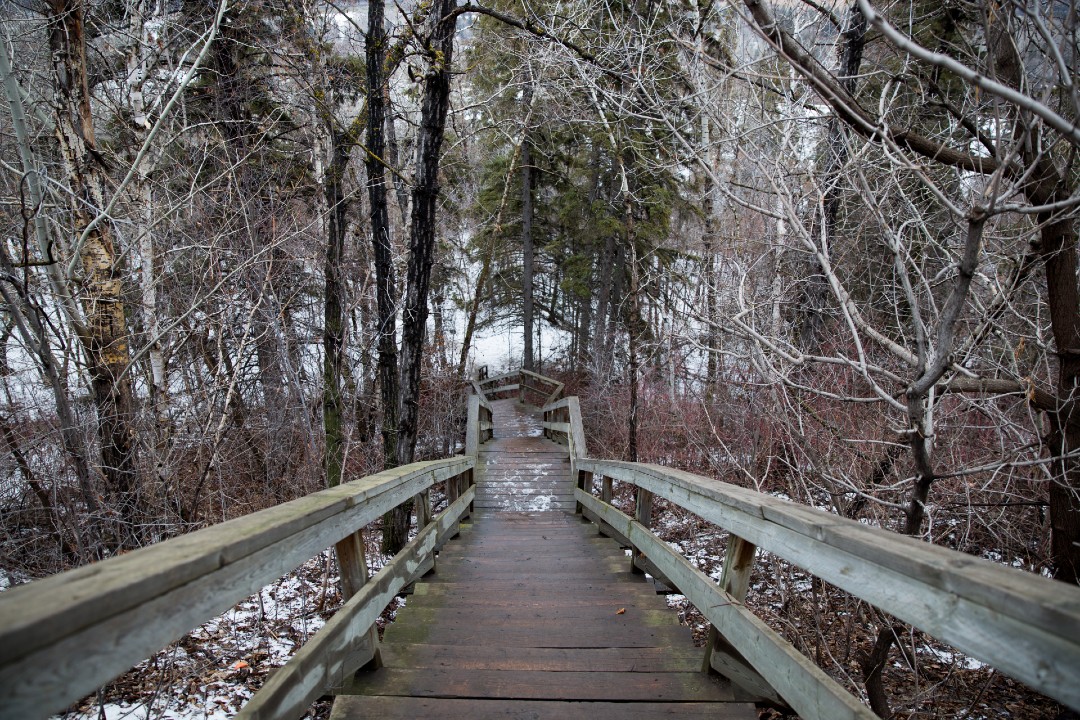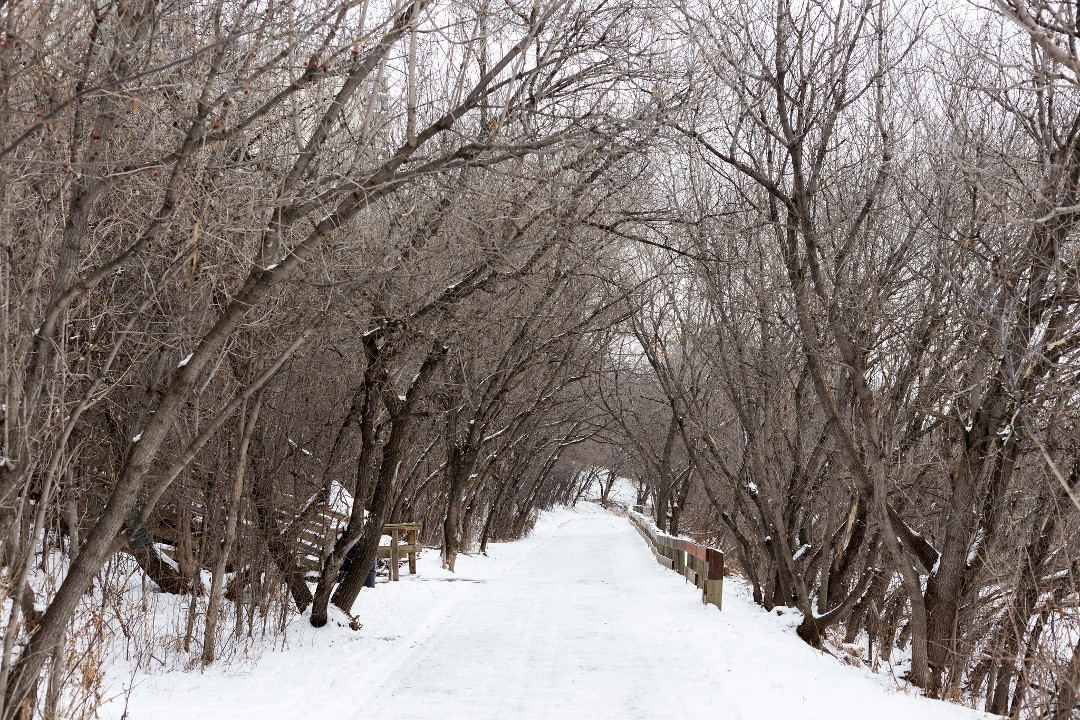An Alberta MLA says his private member's bill, now set for debate as the legislature reconvenes for its spring session, could grant both the provincial government and Albertans control over national urban parks, including one proposed in Edmonton's river valley.
"What happens to Albertans' green spaces is of paramount importance to the people of our province," Leduc-Beaumont MLA Brandon Lunty said, in a release. "While national urban parks may have some benefits, it's critical for the province to have more oversight when it comes to their creation and development."
If passed, Lunty's Bill 204 would amend the Municipal Government Act to prevent municipal councils from negotiating plans for national urban parks with the federal government without specified conditions from Alberta's lieutenant-governor.
Lunty told Taproot he thinks it's important to codify how the province is included in decisions on national urban parks. "This piece of legislation will ensure that those conversations are going to happen in the future," Lunty said.
The City of Edmonton said the province is participating "as an interested observer" in a working committee composed of the city, Parks Canada, and Métis and First Nations representatives.
Official discussions about a national urban park in Edmonton began in 2022. In August, councillors voted to move the project to the planning phase.
Ward Dene Coun. Aaron Paquette said he has supported a national urban park since the idea was first proposed. He acknowledged the province has a legitimate claim to being stewards of the river valley. But Paquette added that claim is mostly "on paper," because the city has taken stewardship responsibilities in practice. "Why (is the province) suddenly interested when they haven't been interested for so long? And why show that interest in the form of legislation that sort of comes out of nowhere, rather than picking up the phone or even walking the few blocks from the legislature to city hall?"
What would a national urban park mean for Edmonton? What would Lunty's bill mean for the proposal? And what is happening elsewhere with national urban parks? Taproot has sought to answer these questions.

A UCP bill set to be debated in the spring sitting of the legislature could block Edmonton from working with Ottawa to create a national urban park. (Mack Male/Flickr)
Councillors, commentators, and advocacy groups have expressed concern that establishing a national urban park will mean giving up control of the river valley to the federal government.
Coun. Tim Cartmell said the city sufficiently protects the river valley, and he's unsure it needs a national park designation. "I don't know what we gain, and I'm concerned there's something that we lose," Cartmell said.
Newspaper columnists have suggested you will have to ask Justin Trudeau for permission to have a firepit in your backyard if the park is created. A petition with more than 5,000 signatures urges city council to "keep Ottawa out of our river valley."
But what could the city's agreement with the federal government to establish a national urban park mean?
The answer is it's hard to know, because national urban parks are a relatively new concept. After the success of Toronto's Rouge National Urban Park, which was nationalized starting in 2011, the federal government introduced a program to explore creating national urban parks across the country.
Looking at cities further along in the process than Edmonton might help one imagine what the governance structure would look like.
Parks Canada said each proposed urban park is going to be established under policy, while existing national parks have been established by amending the Canada National Parks Act.
A national urban park is proposed in Windsor, Ontario. Ojibway National Urban Park would encompass 900 acres of disjointed land currently owned by three levels of government, two First Nations, private landowners, and the Windsor Port Authority, according to reporting by The Narwhal.
Windsor West New Democratic Party MP Brian Masse introduced a federal bill that would add the Ojibway National Urban Park to the National Parks Act, wanting to fast-track the process and keep it consistent with other national parks, but Parks Canada was apprehensive. "If there was a sewer line that the City of Windsor had going through that area, it would now come under the care and control of Parks Canada, and all of the existing federal legislation would come into effect on that piece of infrastructure," Andrew Campbell, senior vice-president of operations for Parks Canada, explained to a federal committee in October 2022.
Masse's bill passed the House of Commons and is now before the Senate, and another Windsor-area MP, Irek Kusmierczyk, said the creation of the park is "a certainty." Port Windsor's land has been transferred to Parks Canada. Parks Canada also provided $1.3 million to the City of Windsor to purchase a residential property for the park.

Edmonton's river valley is Canada's largest contiguous urban parkland area. A federal proposal to create a national urban park has created controversy, however. (Mack Male/Flickr)
Windsor Mayor Drew Dilkens said Parks Canada will own and operate a mix of federal, provincial, and municipal land.
So, one of the first new national urban parks could potentially be created under the National Park Act, bringing the infrastructure under federal control, and be owned and operated by Parks Canada, despite apprehension from the government agency.* This lends credence to concerns that the federal government will control national urban parks. However, Parks Canada maintains the other new national urban parks, including the one proposed in Edmonton, "will be managed under a range of flexible governance models," and "each national urban park will be created within a specific local jurisdictional context."
In a July 2023 report, the City of Edmonton said it does not anticipate it would pursue a transfer of city parkland or governance authority to the federal government.
Parks Canada told Taproot no decisions on governance have been made on the proposed park in Edmonton, and reiterated there is a flexible range of options available. "Governance model options could include third-party administered places (e.g., municipal, provincial, and Indigenous sites) and partnership models (e.g., parks that are co-managed under one name). Federally administered National Urban Parks (e.g., Parks Canada administered properties) can also be considered under certain conditions and where partner interests exist," spokesperson Megan Hope said in an email.
When asked at a council meeting if it's possible that ownership of the river valley could be transferred to the federal government, city manager Andre Corbould said, "Absolutely not, and it's not even being discussed."
Proponents say the new park could mean investment in infrastructure in the river valley — everything from trail maintenance to signage. "It brings much needed investment to Edmonton, which means dollars, jobs, and offsetting our own budget, and it means that the river valley can be preserved for generations to come," Paquette said. "I don't know how anyone could possibly object to that."
Linda Duncan of the North Saskatchewan River Valley Conservation Society said Lunty's bill is another front in the province's ongoing battle with Ottawa. "It is concerning that the government of Alberta would let its battles with the federal government block municipalities from participating in an initiative simply focused on enabling Albertans greater local access to protected nature areas," Duncan said, in a news release.
Progress on the national urban park initiative in Edmonton hasn't appeared to have moved much since the summer of 2023, when council decided to advance to the planning phase, contingent on approval of involved parties. Hope said in an email that Parks Canada will "engage with (the project's) partners and move to the planning phase of the project at the appropriate time."
If Bill 204 becomes law, the future of the park would be, at best, unclear.
Correction: This story has been updated on how Parks Canada will potentially create urban parks.
